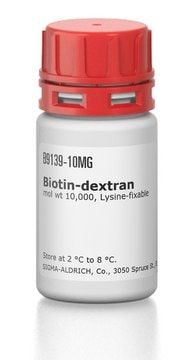757764
Poly(ethylene glycol) 2-aminoethyl ether biotin
average Mn 3,700, cross-linking reagent carboxyl reactive, amine, biotin
Synonym(s):
Polyethylene glycol
About This Item
Recommended Products
Product Name
Poly(ethylene glycol) 2-aminoethyl ether biotin,
form
solid
Quality Level
mol wt
PEG average Mn 3,400 (n~77)
reaction suitability
reagent type: cross-linking reagent
reactivity: carboxyl reactive
transition temp
Tm 53-58 °C
Ω-end
amine
α-end
biotin
polymer architecture
shape: linear
functionality: heterobifunctional
storage temp.
-10 to -25°C
Looking for similar products? Visit Product Comparison Guide
Application
- Bioconjugation,
- drug delivery,
- PEG hydrogel,
- crosslinker,
- surface functionalization
Storage Class Code
11 - Combustible Solids
WGK
WGK 3
Flash Point(F)
Not applicable
Flash Point(C)
Not applicable
Choose from one of the most recent versions:
Already Own This Product?
Find documentation for the products that you have recently purchased in the Document Library.
Customers Also Viewed
Articles
Designing biomaterial scaffolds mimicking complex living tissue structures is crucial for tissue engineering and regenerative medicine advancements.
Designing biomaterial scaffolds mimicking complex living tissue structures is crucial for tissue engineering and regenerative medicine advancements.
Designing biomaterial scaffolds mimicking complex living tissue structures is crucial for tissue engineering and regenerative medicine advancements.
Designing biomaterial scaffolds mimicking complex living tissue structures is crucial for tissue engineering and regenerative medicine advancements.
Our team of scientists has experience in all areas of research including Life Science, Material Science, Chemical Synthesis, Chromatography, Analytical and many others.
Contact Technical Service









